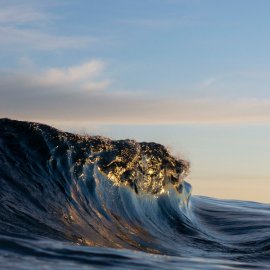New Ocean Finance
-
English
-
ListenPause
[intro music] Welcome to World Ocean Radio… I’m Peter Neill, Director of the World Ocean Observatory. Several recent World Ocean Radio editions seem to have focused on how to assess the value of ecosystems, how to monetize that value as a legitimate balance sheet line, how to create financial instruments by which capital markets and incentives can be directed away from conventional, polluting, destructive use of natural resources on land and sea toward new practices, re-allocated to new solutions that are constructive and sustainable. We have discussed as well problematic outcomes for funds generated by pledges and commitments by national governments, created by transactional schemes such as carbon offsets, ecosystem benefits incorporated into international agreements, and additional funds committed through private foundations, NGO initiatives, and contributions by individuals through voluntarism and social commitment. We have also discussed how all this, amounting to hundreds of millions of dollars, has enabled some progress in many areas of concern, but collectively has not achieved the overall critical outcome, in time, to reverse the continuing degradation and decline of ocean resources and social well-being. We have asked for what else, what more, what new might address this regress and move us forward. But how? One approach might be to restructure the idea of “ownership,” the conventional means by which we control, exchange, license, monetize, regulate property by individuals and by corporate entities legally recognized as individuals – a system that assigns and protects rights as private property as opposed to public resources protected and sustained for the benefit of all. There is some change emerging, away from private ownership of natural capital to public protection by laws asserting the rights of Nature in the form of water resources such as aquifers, watersheds, and ecosystems to defend and protect them as independent entities apart from historic capitalist valuation, exploitation, and trade. Some nations have assigned such rights to rivers for example, and some nations have incorporated this concept of Nature’s Rights into their constitutions as a primary tenant of justice. Such a shift does not preclude capitalism or the use of natural resources, even by private production, but it does provide a structure by which the methods, extent, and consequence of such production are regulated against abuse, irresponsible consumption, the impact of by-product and waste, and lack of accountability. This concept is based on The Nature’s Trust Doctrine that defines all Nature as a public trust, to be used and protected by key principles established to control irresponsible use and exhaustion that removes natural value and deprives ensuing generations of its future utility. As a public trust, Nature is guaranteed sustainability, longevity, and future potential for the benefit of all mankind. As second new approach might be the expansion of the Global Environment Facility, founded in 1991 to “tackle our planet’s most pressing environmental problems.” Since then, it has provided “ more than $21.7 billion in grants and mobilized an additional $119 billion in co-financing for more than 5,000 projects and programs. The GEF is the largest multilateral trust fund focused on enabling developing countries to invest in Nature, and supports the implementation of major international environmental conventions including on biodiversity, climate change, chemicals, and desertification. It brings together 184 member governments in addition to civil society, international organizations, and private sector partners.” I have always admired the GEF. It has been a quiet, effective innovator, its program outside the structure of the United Nations, funded by independent contributions from member nations, aligned with progressive environmental values and responsible science, more than a research organization, more of an enabler or instigator of projects that might set new standards for collaboration, apply new methods and practices, and focus on actual project outcomes. It is primarily a granting organization, funds to underwrite specific outcomes, but it understands finance and could be the place for experiment – a new ocean sustainability bank, for example, an organization within that uses a fund reserved not to incentivize change, but to lend with repayment determined by a new system of capital value based on sustainability principles, natural asset value incorporated into the loan calculation, as a new definition of return on investment. These are not new ideas, but are, if applied, new revolutionary actions for revolutionary times. We will discuss the issues, and more, in future editions of World Ocean Radio. [outro music]
We have focused the last few World Ocean Radio episodes on the value of ecosystems, how we assess, monetize and protect with new practices that are constructive and sustainable. How do we move forward? This week we are discussing potential approaches that include protection of resources and new regulations against abuse and irresponsible consumption, and we propose expanding the Global Environment Facility (GEF), a multi-lateral trust fund, to include a new ocean sustainability bank that incentivizes change and lends funds based on sustainability principles and a new definition of return on investment.
About World Ocean Radio
Peter Neill, Director of the World Ocean Observatory and host of World Ocean Radio, provides coverage of a broad spectrum of ocean issues from science and education to advocacy and exemplary projects. World Ocean Radio is a weekly series of five-minute audio essays available for syndicated use at no cost by college and community radio stations worldwide.
Resources
Global Environment Facility (GEF)
thegef.org
The Public Trust Doctrine (Nature's Trust)
jstor.org/stable/24785947
Rights of Nature Doctrine
celdf.org/rights-of-nature
Image Credit
Thomas Horig / Ocean Image Bank
- Login to post comments



